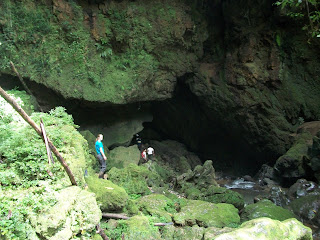I have been having trouble with internet connections lately, so my apologies for the late update. I will attempt to adopt a regular posting schedule, so my readers will know when to expect an update. My goal will be to publish a new post the second and fourth week of each month. This one covers up to October 28, 2012.
A highlight for me in the past 2 weeks was visiting La Finca
Rubel Chahim, a preserve of cloud forest and demonstration farm operated by Rob
& Tara Cahill. Upon my first
visit, I spent the morning watching birds with the Cahill’s son, John. John is an excellent birder with the ability
to identify countless birds by their call, coloration and flight pattern. I saw many new birds that morning. My favorites were the hummingbirds. It so happens that property owned by the
Bezaleel School, where I am serving as an agricultural instructor, is habitat
for the Shear-tailed hummingbird, a rare bird in this area. John took me birding there later in the week
and we had a nice close-up look at one of the males in all his glory.
Beyond birding, I enjoyed the tour of the preserve and farm
with the Don Bosco Catholic Boys School.
I was also able to assist with the agroecology center the Cahills are
constructing. This building will house
classrooms, interns, labs and a food processing facility.
The agroecology center in process
Rob (Center) talking about sustainable agriculture, which cares for the cloud forest as well as feeding the village.
The cave
The next day, I joined the Cahill’s interns on a tour of
the Don Bosco campus near my town of San Juan Chamelco. I especially enjoyed seeing the fields of
guisquil (a tasty squash), malanga (or taro), yucca (cassava), camote (sweet
potato) and maqui (a green of some kind) the school maintains to feed their 300
students. My mind is full of ideas for
starting the same at Bezaleel. I am
particularly fascinated by the root crop, malanga. This is a starchy vegetable substitute for
potatoes here in Guatemala. Potatoes do
not grow well in this damp climate and therefore require frequent fungicide
treatments. Malanga, on the other hand,
grows prolifically without pesticides and once harvested, the stalk is
replanted to grow another crop. This
crop reproduces itself, eliminating the need to purchase new seed.
Harvesting Malanga at Don Bosco
A new field of Malanga
I am settling in with my host family in Chamelco and am
enjoying getting to know the family. I
am staying with Alfredo Siquic, a former pastor and president of the Kekchi
Mennonite Churches. Alfredo and his
wife, Albina, together with their five children currently living at home and me, make
for an active household! One of the
children is adopted, but I have not been told which one. Wili is 19 and the oldest living at
home. He keeps busy with his guipil
business; embroidering the blouses worn by the women in this area. He can create amazing flower designs and at
an amazing speed! Mario is 15 and is
enjoying his vacation from school by playing soccer as often as possible. I have enjoyed some evening soccer games in
the street outside their home. Mariela
is also 15 and together with her mother, makes tortillas 3 times as big as
anyone else in Guatemala, from what I have seen so far. They are great fresh and when toasted, taste
like the best corn tortilla chips I have ever eaten. Ingri and Axel are both 11. I enjoyed a
Sunday afternoon jog with them around the nearby school soccer stadium a week
ago. Alfredo Jr. is 9 and is usually at the house gate to welcome me back from the farm each evening.
Mariela and Axel in the kitchen
La Señora tortiando
(Left to right) Alfredo Jr, Axel and Ingri
Mario in his Sunday best.
Wili hard at work
Though there are no students at the school, I am busy
getting the gardens ready for their return in January. So far Oscar, Pedro and I have transplanted
nearly 100 new banana plants for the coming years.
Planting Bananas with Oscar
Elias, Pedro and I built a second raised bed in
the greenhouse for propagating transplants.
We have seeded Cabbage and Chile Peppers so far.
New raised bed on the left
Last week, Elias, Oscar, Pedro and I constructed composting
bins. The old ones are falling to
pieces. The school has been attempting
to produce vermipost with red worms, but red ants move in and kill the
worms. Tara Katehill told me she has not
had good experience with red worms for that reason and has discontinued using
the method. Therefore, Elias, Oscar,
Pedro and I built three composting compartments. We will follow Sir Albert Howard’s Indore
Method for producing compost at Bezaleel and see how that goes.
Before
Building the composting facility with Pedro and Elias.
It may be crude, but I guess the compost will not care. “Function over form.” as Joel Salatin
says. This was built entirely with
recycled materials from old worm bins at the school.
In the coming weeks, I am looking forward to sowing vegetables for the coming school year. I also hope to visit
another demo garden operated by Medical Teams International, a Christian
organization working to end the rampant malnutrition in this area of
Guatemala. The main problem health-wise
in Guatemala is the same as that in the United States or anywhere else in the
world: getting people to eat their vegetables!





















It's a joy to read your update! It seems like that's the perfect placement for you. It's wonderful to see the Lord continuing to work through you.
ReplyDeleteIt sounds like you are getting right to work.I hope to see you the week of November 26. Tell Alfredo Larry sends greetings. Also, I hope to go birding with the Cahills while there.
Delete